牛津英语7Aunit4语法知识点
牛津译林版英语7A Unit4 My day 知识归纳与拓展
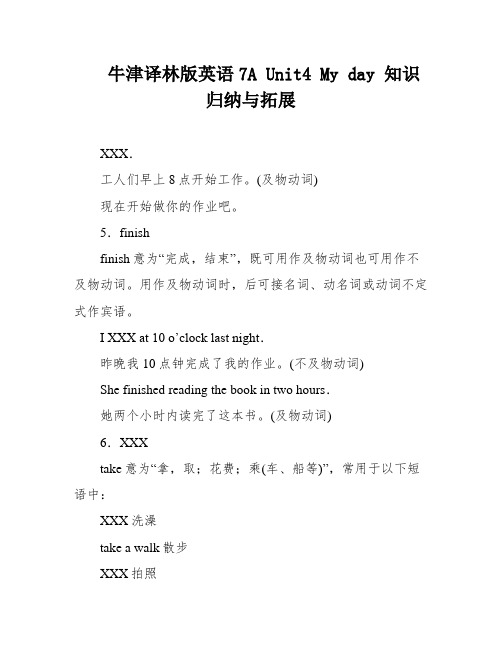
牛津译林版英语7A Unit4 My day 知识归纳与拓展XXX.工人们早上8点开始工作。
(及物动词)现在开始做你的作业吧。
5.finishfinish意为“完成,结束”,既可用作及物动词也可用作不及物动词。
用作及物动词时,后可接名词、动名词或动词不定式作宾语。
I XXX at 10 o’clock last night.昨晚我10点钟完成了我的作业。
(不及物动词)She finished reading the book in two hours.她两个小时内读完了这本书。
(及物动词)6.XXXtake意为“拿,取;花费;乘(车、船等)”,常用于以下短语中:XXX洗澡take a walk散步XXX拍照take a bus乘公共汽车XXX乘出租车XXX慢慢来,不着急take care of照顾,照料XXX off起飞,脱下take on雇用,承担XXX out取出,带出去XXX part in参加7.get upget up意为“起床”,是不及物动词短语。
I usually get up at six in the morning.我通常早上6点钟起床。
语法点拨】1.动词不定式作目的状语动词不定式作目的状语时,常用to do XXX的形式,表示某个动作的目的或意图。
He went to the shop to buy some food.他去商店买些食物。
I went to the library to XXX.我去图书馆借书。
2.时间状语从句时间状语从句是指在主句中表示时间的从句,常用的引导词有when,while,as,before,after,since,until等。
I will call you when I arrive in Beijing.我到北京后会给你打电话。
She was reading a book while her mother was cooking dinner.她妈妈在做饭时,她在看书。
牛津译林版七年级英语上册7A Unit4单元知识点总结
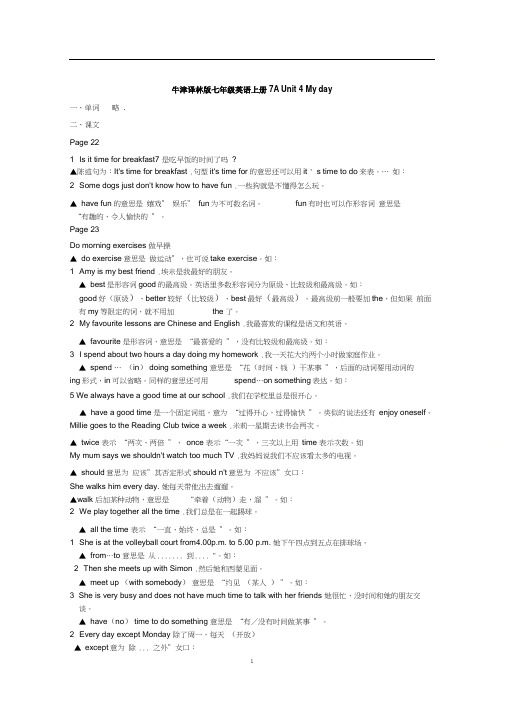
牛津译林版七年级英语上册7A Unit 4 My day一、单词略.二、课文Page 221 Is it time for breakfast7 是吃早饭的时间了吗?▲陈述句为:It's time for breakfast .句型it's time for的意思还可以用it ' s time to do来表。
… 如:2 Some dogs just don't know how to have fun .一些狗就是不懂得怎么玩。
▲have fun的意思是嬉戏” 娱乐” fun为不可数名词。
fun有时也可以作形容词意思是“有趣的,令人愉快的”。
Page 23Do morning exercises 做早操▲do exercise意思是做运动”,也可说take exercise。
如:1 Amy is my best friend .埃米是我最好的朋友。
▲best是形容词good的最高级。
英语里多数形容词分为原级、比较级和最高级。
如:good好(原级)、better较好(比较级)、best最好(最高级)。
最高级前一般要加the,但如果前面有my等限定的词,就不用加the 了。
2 My favourite lessons are Chinese and English .我最喜欢的课程是语文和英语。
▲favourite 是形容词,意思是“最喜爱的”,没有比较级和最高级。
如:3 I spend about two hours a day doing my homework .我一天花大约两个小时做家庭作业。
▲spend … (in) doing something 意思是“花(时间、钱)干某事”,后面的动词要用动词的ing形式,in可以省略。
同样的意思还可用spend…on something表达。
如:5 We always have a good time at our school .我们在学校里总是很开心。
牛津英语 7A Unit 4 单词、短语、句型总结
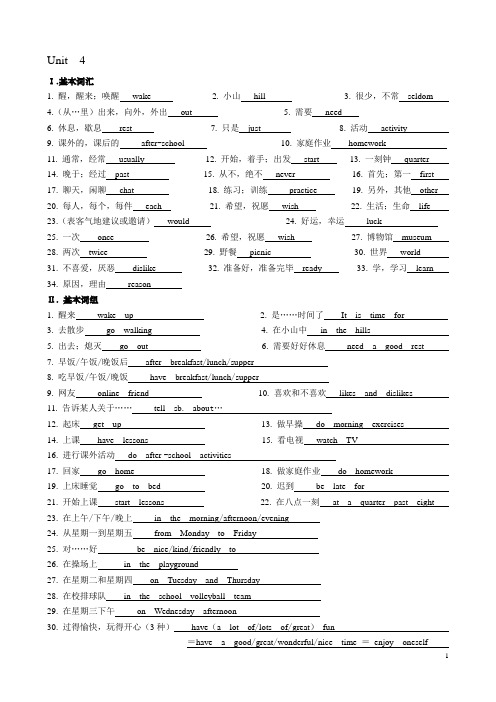
Unit 4Ⅰ.基本词汇1. 醒,醒来;唤醒wake2. 小山hill3. 很少,不常seldom4.(从…里)出来,向外,外出out5. 需要need6. 休息,歇息rest7. 只是just8. 活动activity9. 课外的,课后的after-school 10. 家庭作业homework11. 通常,经常usually 12. 开始,着手;出发start 13. 一刻钟quarter 14. 晚于;经过past 15. 从不,绝不never 16. 首先;第一first 17. 聊天,闲聊chat 18. 练习;训练practice 19. 另外,其他other 20. 每人,每个,每件each 21. 希望,祝愿wish 22. 生活;生命life 23.(表客气地建议或邀请)would 24. 好运,幸运luck25. 一次once 26. 希望,祝愿wish 27. 博物馆museum 28. 两次twice 29. 野餐picnic 30. 世界world31. 不喜爱,厌恶dislike 32. 准备好,准备完毕ready 33. 学,学习learn 34. 原因,理由reasonⅡ. 基本词组1. 醒来wake up2. 是……时间了It is time for3. 去散步go walking4. 在小山中in the hills5. 出去;熄灭go out6. 需要好好休息need a good rest7. 早饭/午饭/晚饭后after breakfast/lunch/supper8. 吃早饭/午饭/晚饭have breakfast/lunch/supper9. 网友online friend 10. 喜欢和不喜欢likes and dislikes11. 告诉某人关于……tell sb. abou t…12. 起床get up 13. 做早操do morning exercises14. 上课have lessons 15. 看电视watch TV16. 进行课外活动do after -school activities17. 回家go home 18. 做家庭作业do homework19. 上床睡觉go to bed 20. 迟到be late for21. 开始上课start lessons 22. 在八点一刻at a quarter past eight23. 在上午/下午/晚上in the morning/afternoon/evening24. 从星期一到星期五from Monday to Friday25. 对……好be nice/kind/friendly to26. 在操场上in the playground27. 在星期二和星期四on Tuesday and Thursday28. 在校排球队in the school volleyball team29. 在星期三下午on Wednesday afternoon30. 过得愉快,玩得开心(3种)have(a lot of/lots of/great)fun=have a good/great/wonderful/nice time =enjoy oneself131. 去阅读俱乐部go to the Reading Club32. 练习做某事practise doing sth. 33. 彼此聊天chat with each other34. 植树plant trees 35. 暑假summer holiday36. 第二十二届世界杯the 22nd World Cup37. 在星期天早晨/下午/晚上on Sunday morning/afternoon/evening38. 在儿童节on Children’s Day 39. 在六岁at six years old40. 给……写回信write back to 41. 想要would like42. 在秋天in autumn 43. 舞蹈课dancing lessons44. 有许多时间做某事have much time to do sth.45. 去溜旱冰go roller skating 46. 一次排球赛 a volleyball match47. 给正确的答案打钩tick the correct answer48. 在比赛中in the match 49. 月光中学Moonlight Middle School50. 在阳光体育中心at Sunshine Sports Centre51. 观看比赛watch the game 52. 好运good luck53. 多长时间一次how often 54. 参观博物馆visit the museum(s)55. 一月两次twice a month 56. 去野餐go on picnics57. 停在公园的一辆汽车 a car in the park58. 穿短裙的女孩 a girl in a skirt59. 在工作的护士 a nurse at work60. 对……有好处be good for 61. 帮某人做某事help sb. do sth. 62. 为……准备好get ready for 63. 喜欢阅读love reading64. 了解更多的关于……learn a lot about…65. 太多的家庭作业too much homework 66. 写下,记下write down67. happiness chart 幸福图表68. not bad 不差Ⅲ. 基本句型1. 早饭时间到了吗?Is it time for breakfast ?2. 一些狗就是不知道怎么玩得开心。
牛津译林版七年级英语上册7A Unit4 知识点与语法点讲解与分析

牛津译林版七年级英语上册7Aunit4知识点与语法点讲解与分析知识点:1 wake up 当接代词作宾语时,代词放在中间,接名词可放后面或中间,类似词组pick up/try on/put on/take of/turn on/turn dow n2 It is time for +sth /doing sth ---- 是----- 的时候了” = It is time to do sth.【拓展】It ' s time for sb to do到某人做某事的时间了eg: It ' s time for you to do your homework— It ' s time for doing your homework.3 sleep/go to sleep/go to bed/ 区另U4 how to have fun是特殊疑问词+动词不定式"构成的不定式短语;have fun=have agood/great/wo nderful time=enjoy on eself 过得愉快"” fun 为不可数名词。
5 watch/look/see/read 区另U6 write to sb给某人写信”7 be nice to sb对某人友好”类似结构:be frie ndly to sb 对某人友好be polite to sb 对某人礼貌8 first adj/adv &n 第一,首先,最初Eg Sun day is the first day of the week.I get back home after school and I do my homework first.【注】first为序数词,前面应加定冠词the。
但序数词作定语且前面有形容词性物主代词等修饰时,不带the。
This is our first less on.固定搭配:at first起先first of all 首先【拓展】firstly adv首先,第一9. once adv 一次;一度Once用作副词,表示一次,具有数量之意,与某一特定范围连用表示频率。
Unit4知识点梳理2023-2024学年牛津译林版英语七年级上册
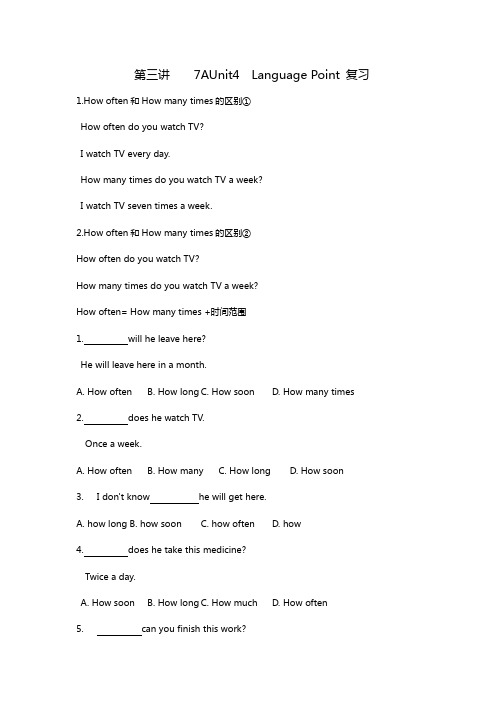
第三讲7AUnit4 Language Point 复习1.How often和How many times的区别①How often do you watch TV?I watch TV every day.How many times do you watch TV a week?I watch TV seven times a week.2.How often和How many times的区别②How often do you watch TV?How many times do you watch TV a week?How often= How many times +时间范围1. will he leave here?He will leave here in a month.A. How oftenB. How longC. How soonD. How many times2. does he watch TV.Once a week.A. How oftenB. How manyC. How longD. How soon3. I don't know he will get here.A. how longB. how soonC. how oftenD. how4. does he take this medicine?Twice a day.A. How soonB. How longC. How muchD. How often5. can you finish this work?A. How oftenB. How manyC. How longD. How soon6. have you been at this factory?I have been here since 1993A. how longB. how soonC. how oftenD. how many7. does your sister write to your parents?A. How soonB. How longC. How muchD. How often8. does it take you to finish you homework every day?.A. How oftenB. How manyC. How longD. How soon9. will he stay here?A. how longB. how soonC. how oftenD. how many10. did the meeting last?About half an hour.A. How soonB. How longC. How farD. How often3.Reading is fun.阅读是有趣的事。
上海牛津英语7A Unit4、5知识点及语法重点

教学内容:7A Unit4、5知识点及语法重点(现在完成时)教学重点:三种时态的训练和巩固教学难点:现在完成时—瞬间动词与延续性动词的转换教学过程:1、课文知识点讲解2、时态练习3、练习巩固4、家庭作业1. 用there be句型表示客观存在(就近原则)2.现在完成时(一)含义现在完成时用来表示现在之前已发生或完成的动作或状态,但其结果却和现在有联系, 也就是说, 动作或状态发生在过去但它的影响现在还存在。
e.g. I have lost my wallet. (含义是:现在我没有钱花了。
)Jane has laid the table.(含义是:已可以吃饭了。
)Michael has been ill.(含义是:现在仍然很虚弱。
)He has returned from abroad. (含义是:现在已在此地)(二)结构助动词have /has+动词过去分词,主语为第三人称单数用has,其他人称用have 。
(三)句型1、肯定句:主语+have /has+动词过去分词+其他。
I have studied English for 5 years .2、否定句:主语+have /has+not +动词过去分词+其他。
We haven’t been there .3、一般疑问句:Have/Has+主语+动词过去分词+其他?Has he eaten that apple ?4、特殊疑问句:特殊疑问词+ have /has +主语+动词过去分词+其他?(四)用法1、现在完成时可以用来表示发生在过去某一时刻的、持续到现在的情况,常与for, since连用。
e.g. Mary has been ill for three days.I have lived here since 1998.2、现在完成时往往同表示不确定的过去时间状语连用, 如already, yet, just, before, recently, lately等:e.g. He has already obtained a scholarship.I haven’t seen much of him re cently (lately).We have seen that film before.Have they found the missing child yet?3、现在完成时常常与表示频度的时间状语连用e.g. Have you ever been to Beijing?I have never heard Bunny say anything against her.I have used this pen only three times. It is still good.George has met that gentleman on several occasions.4、现在完成时还往往可以同包括现在时间在内的时间状语连用,如now, up to these few days/weeks/months/years, this morning/week/month/year, now, just, today, up to present, so far等。
牛津英语沪教版7A,Unit4知识归纳

牛津英语沪教版7A,Unit4知识归纳课题:七年级上Unit4知识梳理与巩固教学目标:1 词汇:company ,removal ,meeting ,hurt ,broken ,carrytake notes ,knock down ,catch fire ,both …and …,run away ,fire engine2 语法:一般现在时(职业的表达及常用句型);一般过去时;see sb doing 看见某人正在做…教学重点、难点:1 . Words and vocabulary2. 一般过去时3. 辨析:see sb doing 和see sb do教学过程:一词汇梳理1. meeting ['mi:ti?] n. 会议【词性转换】 meet [mi:t] v. 遇见;会见;见到Mr White isn’t here; he’s at a meeting. 怀特先生不在这儿,他在开会2. manager ['m?nid??] n. 经理【词性转换】manage ['m?nid?] v. 管理;经营management ['m?nid?m?nt] n. 管理;管理学Our manager is very strict with us. 我们的经理对我们要求很严格。
3. take notes 记笔记Please take notes of the important words while you read.请边读边把重要的单词记下来。
4. knock down 撞倒She was knocked down by a bus. 她被公共汽车撞倒了。
5 catch fire 着火His house caught fire last night. 昨晚他家失火了。
6. both...and... ……两者都【提示】 both...and...连接的两个成分须在形式、时态、词性等方面完全一致。
牛津英语7Aunit4

牛津英语7A unit4 Greetingstake more exercise 多锻炼walk to school 步行上学three time a week 每周三次keep healthy 保持健康join the army 参军the love of one’s country 爱国心want to be 想成为……play cards 玩牌play games 做游戏get …from…从……获得(得到)……would like(sb.)to do sth 想要(某人)干某事less than 不到how much/many 多少keep fit 保持健康not at all 根本不;一点也不feel worried 感到忧虑Good luck with sth/to sb 祝好运be busy doing sth 忙于干……;give sb sth.=give sth to sb 给某人某东西日常用语We need an egg and a tomato for the soup.我们需要一只鸡蛋和一个西红柿做汤。
Would you like a glass of water?你想要杯水吗?Let’s make a pancake.我们做个薄煎饼吧。
语法1.频率副词。
频率副词告诉你事情每隔多久发生一次。
never 0% 从不seldom 20% 很少sometimes 40% 有时often 60% 经常usually 80% 通常always 100% 总是①表示频率的副词在句子中放在动词之前,be动词之后。
例如:I always play basketball with my classmates after school.放学后我总是和同学们打篮球。
Mike is always happy.麦克总是开心。
②表示频率的副词提问,用how often。
例如:How often do you watch TV?你多长时间看一次电视?Twice a month.一个月两次。
上海牛津英语7A-Unit4、5知识点及语法重点

教学内容:7A Unit4、5知识点及语法重点(现在完成时)教学重点:三种时态的训练和巩固教学难点:现在完成时—瞬间动词与延续性动词的转换教学过程:1、课文知识点讲解2、时态练习3、练习巩固4、家庭作业1. 用there be句型表示客观存在(就近原则)2.现在完成时(一)含义现在完成时用来表示现在之前已发生或完成的动作或状态,但其结果却和现在有联系, 也就是说, 动作或状态发生在过去但它的影响现在还存在。
e.g. I have lost my wallet. (含义是:现在我没有钱花了。
)Jane has laid the table.(含义是:已可以吃饭了。
)Michael has been ill.(含义是:现在仍然很虚弱。
)He has returned from abroad. (含义是:现在已在此地)(二)结构助动词have /has+动词过去分词,主语为第三人称单数用has,其他人称用have 。
(三)句型1、肯定句:主语+have /has+动词过去分词+其他。
I have studied English for 5 years .2、否定句:主语+have /has+not +动词过去分词+其他。
We haven’t been there .3、一般疑问句:Have/Has+主语+动词过去分词+其他?Has he eaten that apple ?4、特殊疑问句:特殊疑问词+ have /has +主语+动词过去分词+其他?(四)用法1、现在完成时可以用来表示发生在过去某一时刻的、持续到现在的情况,常与for, since连用。
e.g. Mary has been ill for three days.I have lived here since 1998.2、现在完成时往往同表示不确定的过去时间状语连用, 如already, yet, just, before, recently, lately等:e.g. He has already obtained a scholarship.I haven’t seen much of him re cently (lately).We have seen that film before.Have they found the missing child yet?3、现在完成时常常与表示频度的时间状语连用e.g. Have you ever been to Beijing?I have never heard Bunny say anything against her.I have used this pen only three times. It is still good.George has met that gentleman on several occasions.4、现在完成时还往往可以同包括现在时间在内的时间状语连用,如now, up to these few days/weeks/months/years, this morning/week/month/year, now, just, today, up to present, so far等。
牛津七年级上册英语7AUnit4 My Day知识点总结

7AU4 My Day 知识点一.知识点1. wake up 醒来,叫醒把米莉叫醒wake up Millie = wake Millie up 把我叫醒wake me up妈妈每天早早把我叫醒。
Mum wakes me up early every day.我不想叫醒你。
I don’t want to wake you up.不要叫醒那个婴儿,他要哭的。
Don’t wake up the baby. He will cry.2. Is it time for breakfast? 早餐时间到了吗?It’s time for sth.= It’s time to do sth.做……的时间到了。
上课/上学/睡觉/午饭/开会时间到了。
It’s time to have classes. = It’s time for class.It’s time to go to school.=It’s time for school.It’s time to go to sleep/bed.=It’s time for sleep.It’s time to have lunch. = It’s time for lunch. It’s time to have the meeting. = It’s time for the meeting. It’s time for sb. to do sth. 某人该干某事了。
我们该吃晚饭了。
It’s time for us to have supper.他们该上课了。
It’s time for them to have classes/lessons.你该擦黑板了。
It’s time for you to clean the blackboard.3. Shall we go walking in the hills? 我们去山上散步,好吗?Shall we + do …? (=Let’s do sth, shall we?) 是一个表示提出建议的句型(=What about doing sth?= How about doing sth?=Why not do sth?=Why don’t you do sth?)Shall we go to the cinema tomorrow? Shall we play basketball this afternoon?go shopping/swimming/running/fishing4. seldom 很少,不常(adv ) ,表示否定seldom : not (very) often Tom seldom goes to school. never 从不,绝不我上学从不迟到。
牛津英语七年级Aunit 4知识讲解

英语形容词用法详解 形容词 Adjective 一、形容词的定义 表示人或事物的属性,特征或状态的词 叫形容词(Adjective).形容词修饰名词, 它的基本用法就是为名词提供更多的 信息。
• 句法特点
大多数形容词都可以作定语;在 be,look,seem等词之后作表语;可用very来 修饰,有比较级和最高级形式.其中,在句中作 定语或作表语是形容词最主要的特点.如: Mary is very nice.玛丽很可爱.(表语) Mary is a nice girl.玛丽是个可爱的女孩.(定 语) He was asleep.他睡着了.(表语) She is a perfect teacher.她是位十全十美的 老师.(定语)
3. What„s the weather like in spring?春天天气 怎么样? What„s the weather like …? …天气怎样? 这是询问天气的常用句型也可用How„s the weather …? 来表达。答语一般用“It‟s+ 表示天 气的形容词”表示。 例如:----What„s the weather like in Beijing? ---- It‟s cloudy. -----How„s the weather in summer? -----It‟s hot. 4. start to do sth. 开始做某事
练习
( )1. It is interesting kites in spring . A.fly B. flies C. to fly ( )2. I‟m watching him basketball. A. playing B. play C. to play ( )3. ----What about a film? ------All right. Let‟s go ! A. to see B. seeing C. see ( )4.----What„s the weather like there? ----- It‟s . A.rain B. rains C.rainy
新牛津英语7Aunit4知识点及重点词汇
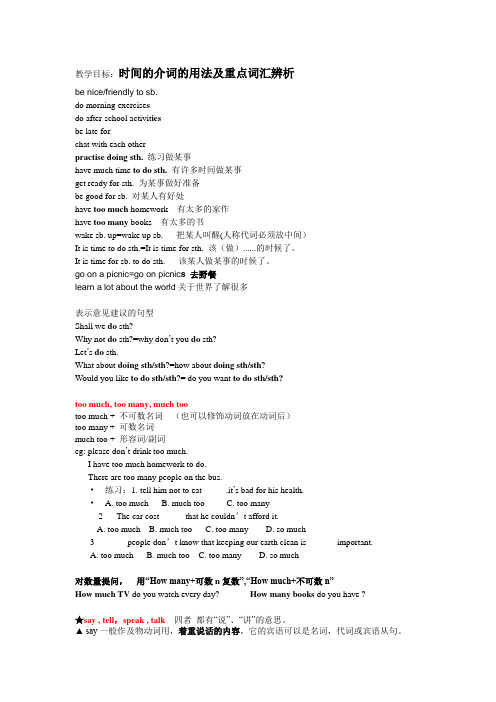
教学目标:时间的介词的用法及重点词汇辨析be nice/friendly to sb.do morning exercise sdo after-school activit iesbe late forchat with each otherpractise doing sth.练习做某事have much time to do sth. 有许多时间做某事get ready for sth. 为某事做好准备be good for sb. 对某人有好处have too much homework 有太多的家作have too many books 有太多的书wake sb. up=wake up sb. 把某人叫醒(人称代词必须放中间)It is time to do sth.=It is time for sth. 该(做)......的时候了。
It is time for sb. to do sth. 该某人做某事的时候了。
go on a picnic=go on picnic s 去野餐learn a lot about the world关于世界了解很多表示意见建议的句型Shall we do sth?Why not do sth?=why don’t you do sth?Let’s do sth.What about doing sth/sth?=how about doing sth/sth?Would you like to do sth/sth?= do you want to do sth/sth?too much, too many, much tootoo much + 不可数名词(也可以修饰动词放在动词后)too many + 可数名词much too + 形容词/副词eg: please don’t drink too much.I have too much homework to do.There are too many people on the bus.•练习:1. tell him not to eat _____.it’s bad for his health.• A. too much B. much too C. too many2The car cost _____ that he couldn’t afford it.A. too muchB. much tooC. too manyD. so much3____ people don’t know that keeping our earth clean is ______ important.A. too muchB. much tooC. too manyD. so much对数量提问,用“How many+可数n复数”,“How much+不可数n”How much TV do you watch every day? How many books do you have ?★say , tell,speak , talk 四者都有―说‖、―讲‖的意思。
译林牛津英语7AUnit4词组、句型、语法.doc

最新译林牛津英语7A unit 4词组、句型、语法一.短语1. wake up2. wake sb. up 醒来叫醒某人3.It ’ s time for sth.It ’ s time (for sb.) to do sth.是(某人)干某事的时候了4. go walking in the hills去山上散步5. seldom go out很少外出6. need a good rest需要好好休息=need to have a good rest7. need to do sth.需要做某事8. write to her online friend写信给她的网友9. do morning exercises做早操10. do eye exercises做眼保健操11. do some exercise锻炼12. have lessons上课13. start (begin) lessons开始上课14. do after-school activities做课外活动15. be never late for work / school上班/ 上学从不迟到16.one of ...之一。
后接可数名词复数17. be all nice to sb. 都对某人很好18. chat with sb. 和某人聊天19. chat with each other 互相聊天20. help each other 互相帮助21. play in the playground 在操场上玩22. be in the school volleyball team 是校排球队成员=be a member of the school volleyball team 23. practise after school 放学后训练practise doing sth. 练习 /训练做某事24. on Wednesday afternoon 在周三下午25. have a good time doing sth=have fun doing sth. 做某事过得愉快26. in spring / summer / autumn / winter27. at 6 years old 在六岁=at 6=at the age of 628. all the best 一切顺利,万事如意29. have much time to do sth. 有很多时间做某事30. have no time to do sth. 没有时间做某事31. go to her dancing lessons 去上舞蹈课32. dance for half an hour 跳舞半小时33. go roller skating 去溜旱冰34. go walking去散步35. between...and...在...和...之间36. visit a museum参观博物馆37.go on picnics with my family twice a month一个月两次和我家人去野餐38. at noon 在中午39. at night 在夜里40. at work 在工作41. be good for sb. 对 ...有益42. be bad for sb. 有 ..害43. help sb. get ready for sth 帮助某人为 ...做好准备44. get ready to do sth 准备好做某事=be ready to do sth.45. learn a lot about sth 关于某事了解很多46. learn more about sth. 关于某事了解更多47. too much homework 太多作业48. too many lessons 太多课49. much too cold (hot )太冷(热)二.句子:1.Some dogs just don’tknow how to have fun. 有些狗就是不知道怎样玩乐。
Unit4 短语句型默写2024-2025学年新版牛津译林版七年级英语上册

7A Unit4School daysWelcome to the unit1 学习是打开世界的钥匙Learning is the key to unlocking the world.2 ★做某事的关键the key to doing...3 学习如何谈论我们的学校生活learn how to talk about our school life4 吃早饭/午饭/晚饭have breakfast/ lunch / dinner 【三餐前不加the】5 ★做早操/眼保健操do morning/eye exercises 【exercise:操练,练习可数】6 ★做更多的锻炼do/take more exercise 【exercise:锻炼不可数】7 ★做课后活动do after-school activities8 帮助家务help with housework9 ★在工作日on weekdays10 在周末at/on weekends = at/on the weekend11 去短暂的慢跑go for a short jog12 ★加入排球俱乐部join the V olleyball Club13 读了一点read a little14 ★玩的开心enjoy oneself = have fun = have a good time15 ★做某事的方法way to do...= way of doing=how to do...16俱乐部活动是我玩的愉快并结交朋友的好方法Club activities are s good way for me to enjoy myself and makefriends.Reading17 我的第一个学期my first term18 我最喜欢语文I like Chinese best.= My favourite subject is Chinese.19 阅读许多著名作家的作品read the works of many famous writers20 ★因为.....而著名be famous for......21 ★作为.....而著名be famous as......22 中国语言令人惊奇The Chinese language is really amazing.23 研究许多活物study many living things24 了解大自然learn about nature25 ★练习做某事practise doing....26 有一个野外考察have a field trip27 ★动身去,到....地方去leave for28 ★收到某人来信hear from sb = get a letter from sb.29 ★希望做某事hope to do ..... 【没有hope sb to do sth】30 希望不久收到你的来信Hope to hear from you soon.31 ★我在校排球队I am in the school volleyball team.=I am a member of the school volleyball team32 明天早晨我们将到公园去摘苹果Tomorrow morning we will leave for a farm to pick apples.33 我们在周二和周四上生物课We have Biology classes on Tuesdays and Thursdays.34 我想要告诉你关于我的学校生活I would like to tell you about my school life.35 ★说一点中文speak a little Chinese36 ★迫不及待做某事can’t wait to do...37 一切顺利All the bestGrammar ---Further studyFurther study38 ★没有许多时间去打网球don’t have much time to play tennis39 在体育场on the sports field40 ★去溜旱冰go roller skating41 跳舞半小时dance for half an hour42 学习如何种植苹果learn how to grow apples43 长大grow up44 帮助种树help plant trees45 在学校网站上on the school website46 看视频watch a video 【video 复数videos】47 参观田野have a tour of the fields48 带一些苹果回家take some apples home49 我喜欢呆在外面I like being outside.50 ★亲近大自然是好的It’s nice to get close to nature.51 ★享受和平和安静enjoy the peace and quiet52 ★每个人都竭尽全力让事情变得更好Everyone tries their best to make things better.53 竭尽全力,尽某人最大努力做某事try one’s best to do....54 ★有时候野外考察对我来说太累了Sometimes field trips are too tiring for me.55 保持我们学校区域干净感觉很好It feels good to keep our school area clean.56参加take part in = join in57帮助我学习如何照料植物help me learn how to take care of plants58轮流去做不同的值日任务take turns to do different chores59小组合作work in groups60给植物浇水water the plants61清空垃圾桶empty the bins62通过值日,我们每个人都为班级做事并学会团队合作We each do something for our class and learn about teamworkthrough chores.7A Unit4School daysWelcome to the unit1 学习是打开世界的钥匙2 ★做某事的关键3 学习如何谈论我们的学校生活4 吃早饭/午饭/晚饭5 ★做早操/眼保健操6 ★做更多的锻炼7 ★做课后活动8 帮助家务9 ★在工作日10 在周末11 去短暂的慢跑12 ★加入排球俱乐部13 读了一点14 ★玩的开心15 ★做某事的方法16俱乐部活动是我玩的愉快并结交朋友的好方法Reading17 我的第一个学期18 我最喜欢语文19 阅读许多著名作家的作品20 ★因为.....而著名21 ★作为.....而著名22 中国语言令人惊奇23 研究许多活物24 了解大自然25 ★练习做某事26 有一个野外考察27 ★动身去,到....地方去28 ★收到某人来信29 ★希望做某事30 希望不久收到你的来信31 ★我在校排球队32 明天早晨我们将到公园去摘苹果33 我们在周二和周四上生物课34 我想要告诉你关于我的学校生活35 ★说一点中文36 ★迫不及待做某事37 一切顺利Grammar ---Further studyFurther study38 ★没有许多时间去打网球39 在体育场40 ★去溜旱冰41 跳舞半小时42 学习如何种植苹果43 长大44 帮助种树45 在学校网站上46 看视频47 参观田野48 带一些苹果回家49 我喜欢呆在外面50 ★亲近大自然是好的51 ★享受和平和安静52 ★每个人都竭尽全力让事情变得更好53 竭尽全力,尽某人最大努力做某事54 ★有时候野外考察对我来说太累了55 保持我们学校区域干净感觉很好56参加57帮助我学习如何照料植物58轮流去做不同的值日任务59小组合作60给植物浇水61清空垃圾桶62通过值日,我们每个人都为班级做事并学会团队合作。
牛津译林版英语7A Unit4 My day知识点归纳

牛津译林版英语7A Unit4 My day知识点归纳XXX.你现在开始做作业吧。
(及物动词)I XXX.我昨天开始读一本新书。
(动名词作宾语)I started to learn English when I was six years old.我六岁时开始学英语。
(动词不定式作宾语)语法点拨】一般现在时的用法1.表示经常性的动作或状态。
I usually get up at six o’clock.我通常六点钟起床。
2.表示客观真理。
XXX moves around the sun.地球绕太阳转。
3.表示现在的状态或情况。
I am a student.我是一名学生。
4.表示将来。
XXX.明天早上六点火车开。
5.表示命令、建议、邀请等。
Don’t smoke in the office.办公室里不准吸烟。
Let’s have a walk after supper.晚饭后我们去散步吧。
6.表示评论、描写、说明等。
This book tells us a lot about Chinese history.这本书向我们讲述了很多中国历史。
写作指导】本文主要介绍了一些常用的词汇及语法点,如动词的用法、时态等。
在写作中,要注意正确使用这些词汇和语法点,以使文章表达准确、流畅。
同时,也要注意文章的格式,如段落的分隔等。
We learn English in school。
It's never too late to learn。
Common phrases with "learn" include "learn about" and "learn from." "Learn" emphasizes the act of learning and acquiringknowledge。
while "learn about" emphasizes gaining n and understanding.Just learning about English doesn't mean you've learned the language。
译林牛津重点初中英语7年级上册(7A)第四单元Unit4知识点汇总
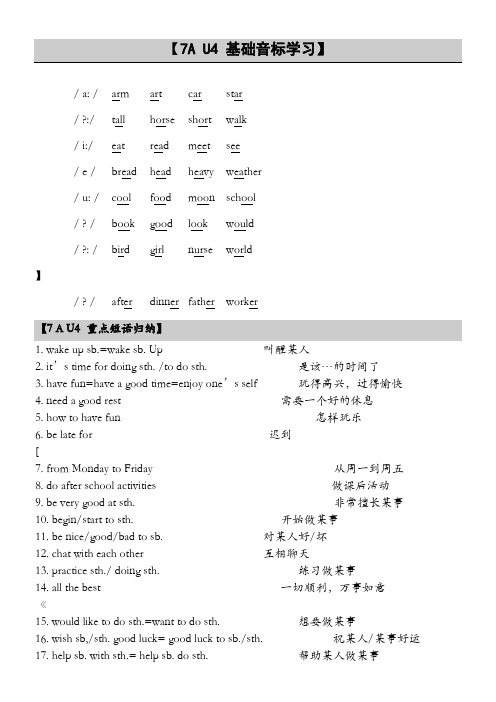
/ a: / arm art car star/ ?:/ tall horse short walk/ i:/ eat read meet see/ e / bread head heavy weather/ u: / cool food moon school/ ? / book good look would/ ?: / bird girl nurse world】/ ? / after dinner father worker【7 A U4 重点短语归纳】1. wake up sb.=wake sb. Up 叫醒某人2. it’s time for doing sth. /to do sth. 是该…的时间了3. have fun=have a good time=enjoy one’s self 玩得高兴,过得愉快4. need a good rest 需要一个好的休息5. how to have fun 怎样玩乐6. be late for 迟到[7. from Monday to Friday 从周一到周五8. do after school activities 做课后活动9. be very good at sth. 非常擅长某事10. begin/start to sth. 开始做某事11. be nice/good/bad to sb. 对某人好/坏12. chat with each other 互相聊天13. practice sth./ doing sth. 练习做某事14. all the best 一切顺利,万事如意《15. would like to do sth.=want to do sth. 想要做某事16. wish sb,/sth. good luck= good luck to sb./sth. 祝某人/某事好运17. help sb. with sth.= help sb. do sth. 帮助某人做某事18. go roller skating 溜旱冰19. between Sunshine Middle School and Moonlight Middle School在阳光中学和月光中学之间20. Sunshine Sports Centre 阳光体育中心21. at/on weekends=at/on the weekends 在周末[22. first=at first=first at all 首先23. visit the museums 参观博物馆24. twice a month 一个月两次25. go on a picnic=have a picnic 去野营26. once a week 一个星期一次27. go on a class/autumn trip 去班级/秋天之旅28. be good/bad for sb. 对某人有利/害29. get ready for sth. 为某事做好准备~30. learn a lot about sth.=know much about sth. 知道很多有关某事【7A U4 重点语法点拨】时间介词(at, in ,on) 的用法1.at(1)时间的一点、时刻等。
牛津7A_Unit4_教学要求,知识点讲解和练习 无
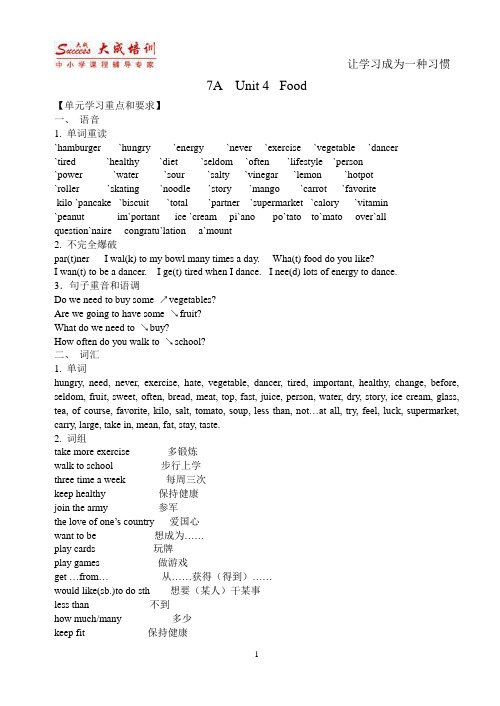
7A Unit 4 Food【单元学习重点和要求】一、语音1. 单词重读`hamburger `hungry `energy `never `exercise `vegetable `dancer`tired `healthy `diet `seldom `often `lifestyle `person`power `water `sour `salty `vinegar `lemon `hotpot`roller `skating `noodle `story `mango `carrot `favoritekilo `pancake `biscuit `total `partner `supermarket `calory `vitamin`peanut im`portant ice `cream pi`ano po`tato to`mato over`allquestion`naire congratu`lation a`mount2. 不完全爆破par(t)ner I wal(k) to my bowl many times a day. Wha(t) food do you like?I wan(t) to be a dancer. I ge(t) tired when I dance. I nee(d) lots of energy to dance.3.句子重音和语调Do we need to buy some ↗vegetables?Are we going to have some ↘fruit?What do we need to ↘buy?How often do you walk to ↘school?二、词汇1. 单词hungry, need, never, exercise, hate, vegetable, dancer, tired, important, healthy, change, before, seldom, fruit, sweet, often, bread, meat, top, fast, juice, person, water, dry, story, ice cream, glass, tea, of course, favorite, kilo, salt, tomato, soup, less than, not…at all, try, feel, luck, supermarket, carry, large, take in, mean, fat, stay, taste.2. 词组take more exercise 多锻炼walk to school 步行上学three time a week 每周三次keep healthy 保持健康join the army 参军the love of one’s country爱国心want to be 想成为……play cards 玩牌play games 做游戏get …from…从……获得(得到)……would like(sb.)to do sth 想要(某人)干某事less than 不到how much/many 多少keep fit 保持健康not at all 根本不;一点也不feel worried 感到忧虑Good luck with sth/to sb 祝好运be busy doing sth 忙于干……;give sb sth.=give sth to sb 给某人某东西三、日常用语We need an egg and a tomato for the soup.我们需要一只鸡蛋和一个西红柿做汤。
Unit4知识点整理牛津译林版七年级英语上册
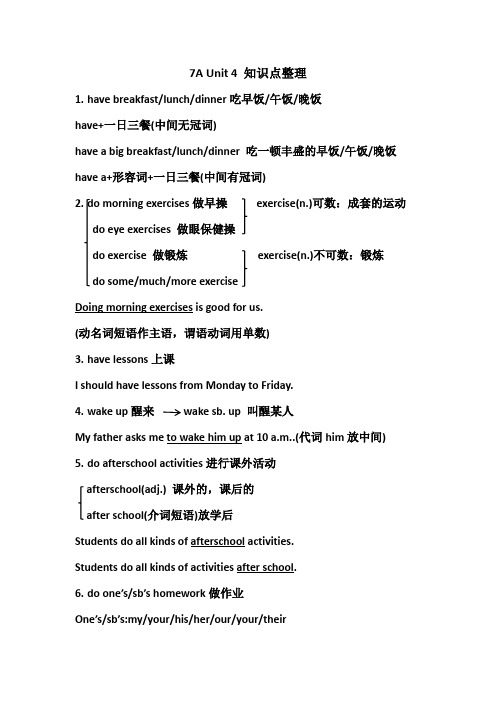
7A Unit 4 知识点整理1.have breakfast/lunch/dinner吃早饭/午饭/晚饭have+一日三餐(中间无冠词)have a big breakfast/lunch/dinner 吃一顿丰盛的早饭/午饭/晚饭have a+形容词+一日三餐(中间有冠词)2.do morning exercises做早操exercise(n.)可数:成套的运动do eye exercises 做眼保健操do exercise 做锻炼exercise(n.)不可数:锻炼do some/much/more exerciseDoing morning exercises is good for us.(动名词短语作主语,谓语动词用单数)3.have lessons上课I should have lessons from Monday to Friday.4.wake up醒来wake sb. up 叫醒某人My father asks me to wake him up at 10 a.m..(代词him放中间) 5.do afterschool activities进行课外活动afterschool(adj.) 课外的,课后的after school(介词短语)放学后Students do all kinds of afterschool activities.Students do all kinds of activities after school.6.do one’s/sb’s homework做作业One’s/sb’s:my/your/his/her/our/your/their肯定句:She often does her homework in time.疑问句:Does she do her homework in time?否定句:She doesn’t do her homework in time.7.go to bed去睡觉Young people often go to bed late.8.be late for迟到Don’t be late for school tomorrow.(Don’t do sth.祈使句否定) 9.at a quarter past eight 在8:15(past几点过了几分)at 8:30/at 6 years old/at Christmas/at noon/at night/at lunch (at+时刻/年龄/不以Day结尾的节日/固定搭配)10.It is time for sth.=It is time to do sth.到了做...的时间It is time for dinner.=It is time to have dinner.It is time for sb. to do sth. 对于某人来说到了做...的时间It is time for us to do more exercise.11.Shall we do sth.? 让我们做...可以吗?Let’s do sth., shall we? 让我们做...可以吗?What/How about doing sth.? 做...怎么样?提出建议Why not do sth.? 为什么不做...呢?Why don’t you do sth.? 为什么不做...呢?12.go walking去散步go running/swimming/shopping/fishing: go+Ving去做某事13.go out出去Eddie is lazy, so he seldom goes out.14.need a good rest=need to have a good rest需要好好休息need sth./need to do sth. 需要.../需要做......After doing some afterschool activities, I need a good rest.After doing some afterschool activities, I need to have a good rest.15.how to have fun如何玩乐(特殊疑问词+to do sth.)Some dogs just don’t know how to have fun.16.have (lots of/great) funhave a good/great/wonderful time 玩得开心enjoy oneself(myself/yourself/himself/herself/...)have fun doing=have a good time doing做...很开心They have fun watching basketball matches on TV.They have a good time watching basketball matches on TV.17.start/begin to do sth. 开始做某事We start/begin to have lessons at eight in the morning.18.from Monday to Friday 从周一到周五19.do morning exercises first 先做早操20.my favourite subject 我最喜爱的科目21.chat with each other(chatchatting) 彼此聊天Girls enjoy chatting with each other after class.22.in the morning/afternoon/evening 在早上/下午/晚上in the morning/in 2022/ in October/in autumn(in+一天的早中晚/年份/月份/季节)23.have a Reading Club 有一个阅读俱乐部24.on Thursday afternoon 在周四下午on Sunday/on October 1/ on the morning of October 1/ on a cold winter morning/on Children’s Day(on+星期/日期/具体某一天的早中晚/以Day结尾的节日)25.be in the school volleyball team 在学校的排球队=be a member of the school volleyball teamSimon is in the school volleyball team.=Simon is a member of the school volleyball team.26.practise doing sth. 练习做某事Millie and Sandy like practising playing volleyball after school.27.have much time to do sth. 有许多时间做某事have time to do sth. 有时间做某事have enough time to do sth. 有足够的时间做某事have little time to do sth. 几乎没有时间做某事have no time to do sth. 没有时间做某事28.go to her dancing lessons 去上舞蹈课29.dance for half an hour 跳舞半小时(for+一段时间)30.go roller skating 去溜旱冰31.Wish our team good luck. 祝我们的队好运。
牛津译林版七年级上册第四单元知识点
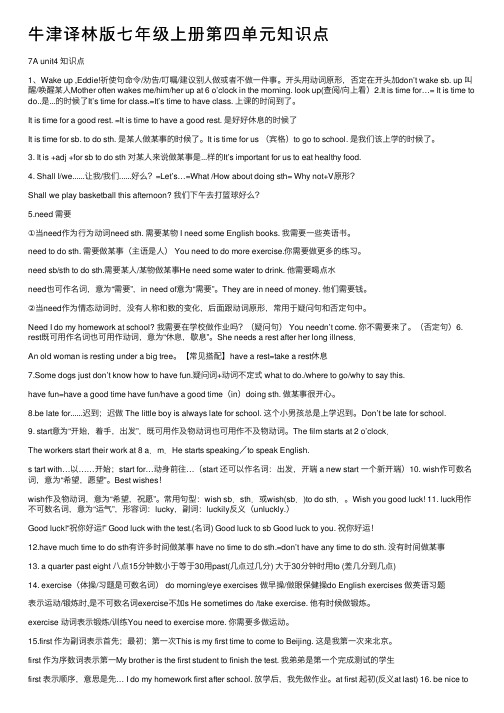
⽜津译林版七年级上册第四单元知识点7A unit4 知识点1、Wake up ,Eddie!祈使句命令/劝告/叮嘱/建议别⼈做或者不做⼀件事。
开头⽤动词原形,否定在开头加don’t wake sb. up 叫醒/唤醒某⼈Mother often wakes me/him/her up at 6 o’clock in the morning. look up(查阅/向上看)2.It is time for…= It is time to do..是...的时候了It’s time for class.=It’s time to have class. 上课的时间到了。
It is time for a good rest. =It is time to have a good rest. 是好好休息的时候了It is time for sb. to do sth. 是某⼈做某事的时候了。
It is time for us (宾格)to go to school. 是我们该上学的时候了。
3. It is +adj +for sb to do sth 对某⼈来说做某事是...样的It’s important for us to eat healthy food.4. Shall I/we......让我/我们......好么?=Let’s…=What /How about doing sth= Why not+V原形?Shall we play basketball this afternoon? 我们下午去打篮球好么?5.need 需要①当need作为⾏为动词need sth. 需要某物 I need some English books. 我需要⼀些英语书。
need to do sth. 需要做某事(主语是⼈) You need to do more exercise.你需要做更多的练习。
need sb/sth to do sth.需要某⼈/某物做某事He need some water to drink. 他需要喝点⽔need也可作名词,意为“需要”,in need of意为“需要”。
牛津译林版7AUnit4My Day基础考点大梳理

牛津译林版7AUnit4My Day基础考点大梳理一、短语归纳1.wake up醒来2. go out出去3. have breakfast吃早饭4. have lunch吃午饭5. have dinner吃晚饭6. have fun玩得高兴7. get up起床8. go to school去上学9. do morning exercises做早操10. have lessons.上课11. do after-school activities进行课外活动12. watch TV看电视13. go to bed去睡觉14. be late for迟到15. in the morning在上午16. from Monday to Friday从星期一到星期五17. be good at =do well in擅长18. a lot of friends许多朋友19. be nice to sb.=be good to sb.对某人好20. after class课后21. chat with聊天22.in/on the playground在操场上23.go to the library去图书馆24.in the afternoon在下午25. read books读书26. on Tuesday在星期二27. like playing volleyball喜欢打排球28. in the school volleyball team在校排球队29. on Wednesday afternoon在星期三下午30. in the evening在晚上31. each other.互相,彼此32. have a good time have fun enjoy oneself过得愉快,玩得高兴33. best wishes最好的祝福34. go to dancing lesson去上舞蹈课35. go roller skating去溜旱冰36. goon a picnic去野餐37. once a month一月一次38.be good for 对.....好处be bad for 对.....坏处39.too much太多(的) much too (实在)太40. get ready for sth. 为某事准备好二、句法总结1. time(1)It is time for +n. 到....的时间了。
- 1、下载文档前请自行甄别文档内容的完整性,平台不提供额外的编辑、内容补充、找答案等附加服务。
- 2、"仅部分预览"的文档,不可在线预览部分如存在完整性等问题,可反馈申请退款(可完整预览的文档不适用该条件!)。
- 3、如文档侵犯您的权益,请联系客服反馈,我们会尽快为您处理(人工客服工作时间:9:00-18:30)。
牛津英语7A unit4语法知识点
1. It's very easy for me to get tired when I dance.
我跳舞时很容易感到累。
该句为一固定句型:It's + adj. + (for sb) + to do sth
“做某事对于某人来说是……”,句中It为形式主语,真正的主语是后面的动词不定式
结构。
It's very hard for us to finish the work on time.
要按时完成这项工作是非常困难的。
It's very important for everyone to celebrate Christmas.
庆祝圣诞节对每个人来说都是很重要的。
2. I usually have fruit and vegetables because I want to be healthy.
因为我想健康,所以我经常吃水果和蔬菜。
because是连词,意思是“因为”,用来引导表原因的状语从句。
在汉语中常用“因为……,所以……”表原因和导致的结果,但在英语中这样的关联词不能同时出现在一个句子中,只能用其中一个。
He doesn't come to school because he is ill.= He is ill so he doesn't
come to school.
因为他生病了,所以没来上学。
3. 英语中表示频率的副词按频率由高到低依次是:always, usually, often, sometimes, seldom, never
She always gets up at six.
她总是六点钟起床。
They sometimes go skiing in winter.
冬天他们有时去滑雪。
对频率副词提问用how often
—How often do you go swimming? 你多久去游一次泳?
—I never go swimming. 我从不去游泳。
4. This helps me start the day.
这帮助我开始一天(的生活)。
5. I need vitamin to get healthy.
我需要维他命来保持健康。
6. I sometimes have rice with fish and an apple for lunch.
午餐我有时吃米饭,以及鱼和苹果。
rice和fish这里是不可数名词;apple是可数名词。
单数可数名词之前须有不定冠词a或an,不可数名词之前没有。
句型:
1). Sandy doesn't have much time to play badminton.
桑迪没有多少时间打羽毛球。
2). I think we need some Coke and three cartons of milk.
我认为我们需要一些可乐和三纸盒牛奶。
3). There's a carton of milk, a carton of orange juice and a bottle of Coke.
有一纸盒牛奶,一纸盒橙汁以及一瓶可乐。
